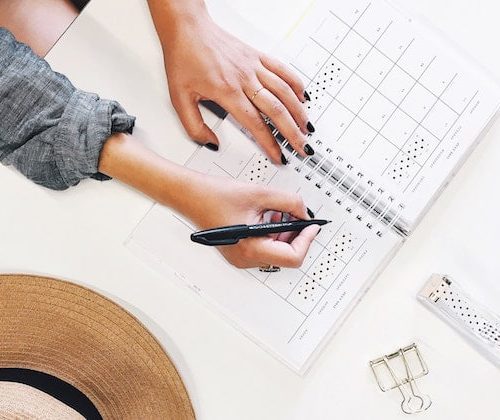New year, new goals
New Year Resolutions – three words that can send even the most level-headed among us into an existential black hole. While many prefer to set goals throughout the year, there’s nothing quite like the renewed sense of purpose a new year inspires. After all, what would January be without frenzied re-evaluation of oneself and every decision we’ve ever made?
With Google on fire with searches about ‘how to achieve goals’ as of late, we’re here to offer something a little extra in terms of not only sharing methods for framing your goals, but science-backed ways to putting yourself on the track to success which you may not have tried before.
Read more: Gig It ‘Til You Make It: 8 Side Hustles You Can Do In Hong Kong

Visualise the life you want in 2018
It’s not enough to know what you want to change, and expect yourself to follow through with it. First, it’s important to pinpoint the broader vision you want to materialise in your life, and evaluate the role your goals will play in this vision. For instance, your goal of getting more sleep could be a sign you need to slow down as a whole, or your goal of bettering your relationship with someone could indicate feelings of isolation.
Gaining this wider perspective will not only answer the question of why you want to set these goals, which informs the level of motivation you’ll have to achieve it, but help you frame how you want to feel. After all, the ultimate aim for achieving our goals is to change how we feel day-to-day, whether it’s healthier, more content, or more fulfilled. This feeling is what you should consider as your game-changer goal, or the catalyst to drive you reach every other goal on your list.
Read more: How to Get a Pay Rise
Visualisation boards are powerful in helping you internalise this feeling, as mental imagery has shown to activate the same brainwaves as real practice, according to Psychology Today. To get started: bring your vision to life by collecting images that induce the feeling you want to generate – it can be concrete things you want (e.g. a clutter-free flat, a dream travel destination, etc.) or the mood you want to capture (e.g. a placid lake, a vibrant abstract painting, etc.).
Pin these images to a cork board, decorate to your heart’s desire, and place it in a part of the home where you’ll see it everyday. Revisit and redo as needed – the rule is there are no rules.
Read more: 32 Podcasts to Listen to on Your Work Commute
Set the right goals in the first place
Setting the right goals is for yourself is almost a science, as they should be challenging enough to push you to make a change, while being attainable enough for you not to feel discouraged. The way to do so is simple: write it down. No, we don’t mean scribbling them on a napkin, and shoving it in your pocket. Set aside and dedicate time to organise your thoughts with intention, as studies have shown there to be a direct correlation between this practice and your success.
A Harvard study found that the three percent of students in one of their MBA classes who wrote down their goals earned on average “10 times as much as the other 97 percent of the class combined” a decade after they were first asked about their goal-setting practices.
How do you go about doing so? Start by finding a calming environment with zero distractions and go through the following points with each goal you have in mind. Take your time, consider your visualisation board, and feel free to revise as you go. Try to get all your thoughts down first, and worry about refining them later.
1. The goal – be as specific as possible, write down the number of burpees you want to be able to do, and make sure it’s measurable.
E.g. I want to find a new job in a new industry, so I can explore what else is out there.
2. When and how you plan on achieving it – include a timeline (doesn’t have to be confined within one year) and specific steps or action points.
Eg. I want to align with recruiters by February or March to understand my market value, and go on at least half a dozen interviews before making a decision to accept a new role.
3. Understand why you want to achieve this goal – think about what you’ll gain and how the change will benefit your life.
Eg. I want to experience something new and earn more money, so I can pursue opportunities I can’t right now.
4. What you’ll get once you’ve achieved it – this can be a real reward (e.g. run a half marathon and treat myself to a new pair running shoes) or it can just be a feeling (e.g. I’ll feel stronger physically)
Eg. I’ll move into a larger flat since I’ll be earning more, which will then allow me to have more room to pursue my hobbies and have friends over – two things that make me really happy.
5. How to manage the future outcome – this is especially significant if your goal is something you’ll need to follow through with in the long-term (e.g. quitting smoking, exercising more, etc.)
Eg. I want to excel in this new position, and make strides in my career.
Read more: 8 Lessons to Help You Take Ownership of Your Job

Get into the habit of journaling
Of all the methods noted on this list, journalling is the most crucial determinant for achieving your goals. It’s a keystone habit that serves as a daily reminder of why you’re making this commitment, and is a means tracking your progress. By evaluating your experiences, you’re able to better organise your time, shape your priorities, and elevate your self-awareness. Whether you’ve never journalled a day in your life or are already a seasoned scribe, there’s a method out there that will suit you.
First, have a system in place that you’re confident you’ll be able to keep up. If you’re new to journaling, something simple like a daily to-do list or the bullet journaling method may be suitable. If you’re already an avid journaler, then you may want to go with traditional, long-form paragraphs, which allows more room for introspection. Other methods include one-line-a-day journaling for those with busy schedules or visual journals for those who like to think outside the box and get their hands dirty.
Now that you have a system in place, it’s time to consider how you’ll be keeping track of your goals, so you can habitually remind yourself to work towards and develop a better trajectory for achieving them. Start by writing down your goals at the start of your journal, then decide how frequently you’ll be reviewing them. Whether it’s daily or weekly, the important questions to ask yourself and record down are:
- How am I progressing with achieving these goals? Have I hit any targets or milestones?
- What were some obstacles I faced or what held me back in achieving this goal? How can I change this?
- What can I do tomorrow or next week that will bring me one step closer to my goal?
Lastly, leave room for gratitude journaling in your routine by writing down one thing everyday or every week you’re grateful for and why. Studies have shown that practicing gratitude is linked to improved stress levels, sleep, and overall health. Honing your thoughts on the positive allows you to have more mental resilience to tackle challenges and be in the right state of mind to persevere and achieve those goals. Not sure how to start? You can check out this 52 Lists of Happiness – try working on one list per week as a pre-bedtime activity.
Find someone to keep you accountable
We may have the best of intentions to achieve our goals, but life often gets in the way. We get caught up in the daily grind, navigating the muddy waters of dating, or keeping up with the constant stream of invites to birthdays, housewarmings, and baby showers. While these experiences make up our daily lives, it can limit the time we have to work on ourselves.
Sharing your goals with a close friend or family member can help you continue the momentum to keep going when progress is waning. Research has shown that having a committed accountability partner can increase your chance of success by to up to 65%.
The key here is to find someone who’s reliable, strives to see you succeed, and is not afraid to call you out when necessary. Ideally, find someone who’s also working on similar goals, so you both have the incentive to push one another. For instance, if your goal is to learn a new language, then it may be a good idea to sign up for a language course, and connect with a classmate who has a similar aim.

Practice loving yourself and loving others
Setting a goal builds self-esteem in itself, so you’re already owning it! But it’s only the tip of the iceberg when it comes to practicing self-love. Only when you’re confident are you able to have the courage to really put 100% into working towards your goals, rather it being the other way around. In other words, put aside statements like I’ll start training with other people once I’m more confident about how fit I am. Instead, frame it in a more positive way and tell yourself that I’ll gain more confidence as I train, and doing so with others will only motivate me more.
By simply changing the way you frame your statements, you’re able to alter the emotion associated with the goal, notioning you to actualise it in a positive way. Remember: don’t be too hard on yourself, and be sure to treat yourself often with activities you enjoy or relaxes you like taking a bath, going for a long hike, or cooking your favourite meal.
In a similar vein, giving back to others is another way to channel positivity and happiness into your life, allowing you the perspective work harder towards your own goals. Countless studies have noted the benefits of helping others, including triggering the pleasure chemicals in our brains, boosting confidence, creating lasting bonds, and improving overall health and longevity.
Again, this goes back to the idea that happier and more confident individuals are more resilient in terms of following through with goals they set for themselves. Take the time to volunteer for a local charity you’re passionate about, mentor students who want to pursue a similar path to you, or tutor someone who otherwise would not have the resources to obtain a certain skill. Over time, you’ll likely find that helping others succeed is in fact what you consider your biggest success.
Good luck on all your endeavors in 2018!
Featured image credited STIL via Unsplash, image #1 credited to freestocks.org via Unsplash, image #2 credited to Haley Powers via Unsplash, image #3 credited to Carl Heyerdahl via Unsplash





 Eat & Drink
Eat & Drink



 Travel
Travel



 Style
Style



 Beauty
Beauty



 Health & Wellness
Health & Wellness



 Home & Decor
Home & Decor



 Lifestyle
Lifestyle

 Weddings
Weddings





